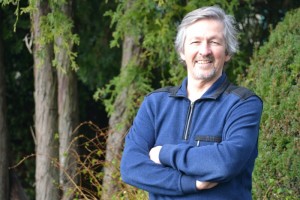Know Your Profs is an ongoing series of profiles on the instructors at Camosun College. Every issue we ask a different instructor at Camosun the same 10 questions in an attempt to get to know them a little better.
Do you have an instructor that you want to see interviewed in the paper? Maybe you want to know more about one of your teachers, but you’re too busy, or shy, to ask? Email editor@nexusnewspaper.com and we’ll add your instructor to our list of teachers to talk to.
This issue we talked to Camosun Religion and History prof Clarence Bolt about his trade, how he is just as much of a student as he is a teacher, and his favourite Indonesian meal.
1: What do you teach and how long have you been a teacher at Camosun?
I teach World Civilizations before 1500 and World Religions of the West: Judaism, Christianity, and Islam. This semester, I’m doing a special topics course on the Tanakh (Old Testament) as literature. I’ve taught at Camosun for over 30 years.
2: What do you personally get out of teaching?
The big secret is that as an instructor, I am no more and no less than a full-time continuing student, a life-long learner. It’s tremendously rewarding to see students understand and embrace a broader view of the world than our still largely western one.
3: What’s one thing you wish your students knew about you?
That I don’t know everything! Actually, they know that. Given what I teach, they may be interested to know that I love science fiction. I am particularly struck by the prominence of religious themes and ideas (Noah, Moses, Armageddon) in science fiction. I also love animation. My childhood favourite, Curious George, still rocks!

4: What’s one thing you wish they didn’t know about you?
Really? Answering would be telling!
5: What’s the best thing that’s ever happened to you as a teacher here?
There is no one “thing.” Rather, it’s what Camosun does for so many students. We bring in students, many who’ve been out of school for years and for whom, for one reason or another, academic education wasn’t a priority. As they navigate Camosun’s world, they thrive, motivate themselves, and become what they never imagined. Some go on to degrees, even grad school, and become teachers, doctors, lawyers, and even historians. Others return to previous environments recharged, contributing to their communities in positive ways. I am privileged to be part of a world that really changes lives.
6: What’s the worst thing that’s ever happened to you as a teacher here?
Again, it’s not one thing, but it relates to the last point. Over the years, I have watched several iterations of budget cuts. Courses get cut not because of their importance to education but because of bottom-line thinking and narrow views of postsecondary education. Many decisions narrowed student possibilities and options, countering Camosun’s promise of meeting the changing needs of the future by offering lifelong, life-changing learning.
7: What do you personally see in the future of postsecondary education?
I distinguish between training and education. Our provincial government’s focus on jobs and skills training doubtless adds value to the element of our labour force that works in resources, trades, construction, and the like. Many people in my generation trained for resource-industry jobs but are now unemployed because changing technology and markets rendered their skills obsolete. Many had low levels of education. There are ever fewer jobs in these areas, a trend that will continue. Education, on the other hand, as delivered by Arts and Sciences, and which our government consciously undervalues and underfunds, provides the critical thinking and analytical tools by which we create the skill sets and mindsets needed to adapt to a changing world in which many of today’s jobs will no longer exist tomorrow. These thinking and analytical tools will be increasingly valuable… no, essential if today’s and tomorrow’s people are to navigate the future, whether as citizens, bosses or employees, consumers or producers, and whatever other identities they possess. Governments, boards of colleges, and administrators need to acknowledge that education, as here defined, is an “essential service,” and they must follow through with appropriate policies, funding, and promotion.
8: What do you do to relax on the weekends?
Aside from marking papers, Mona [Brash, Camosun Political Science instructor and Bolt’s wife] and I choose from a menu that includes biking and going for long walks along the ocean, having coffee, and reading newspapers at a local coffee shop, dining at our favourite restaurant, gardening, reading, taking in a movie… very civilized.
9: What is your favourite meal?
It’s hard to pick a favourite. I love food! I make a mean bami goring, an Indonesian dish that was part of my growing up.
10: What’s your biggest pet peeve?
It’s a toss-up between passive-aggressive behaviour or sloppy thinking, especially dogmatic assertions with absolutely no evidence, or, even worse, clearly contradicted by evidence.
